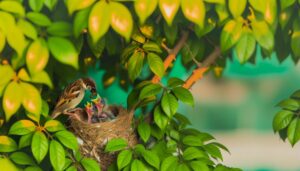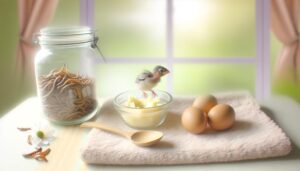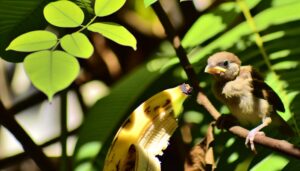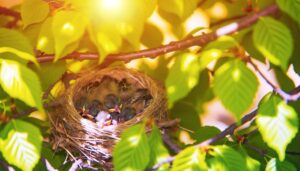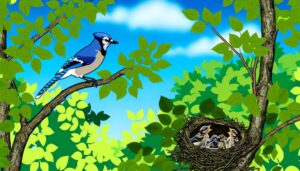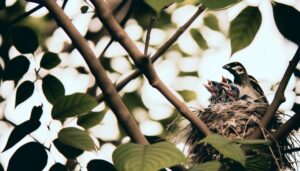Nourishing Baby Sparrows with Bread and Seed Alternatives
You shouldn't feed baby sparrows bread. Bread lacks the essential proteins, fats, and vitamins necessary for their growth, leading to malnutrition and potential digestive issues.
In the wild, sparrow parents provide a diet rich in insects and seeds, offering the vital nutrients baby sparrows need. Bread fails to meet these nutritional requirements and can hinder their development, affecting feather formation and overall health.
Instead, consider creating a homemade diet of boiled egg yolk, insect larvae, greens, and grains, which better mimics their natural nutritional intake. To fully support their growth, there may be other solutions you'll find useful.
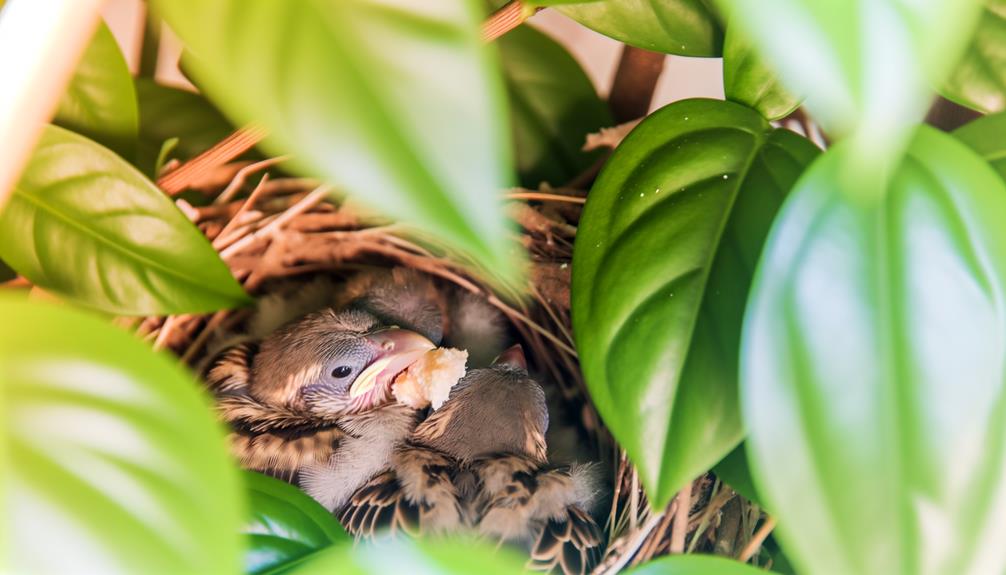
Key Takeaways
- Bread lacks essential proteins, fats, and vitamins needed for baby sparrow growth.
- Feeding baby sparrows bread can lead to malnutrition and digestive issues.
- A balanced diet of insects and seeds is crucial for proper development.
- Bread deprives baby sparrows of necessary nutrients for feather and bone growth.
- Homemade bird food with boiled egg yolk and insect larvae is a better option.
Understanding Baby Sparrow Nutrition
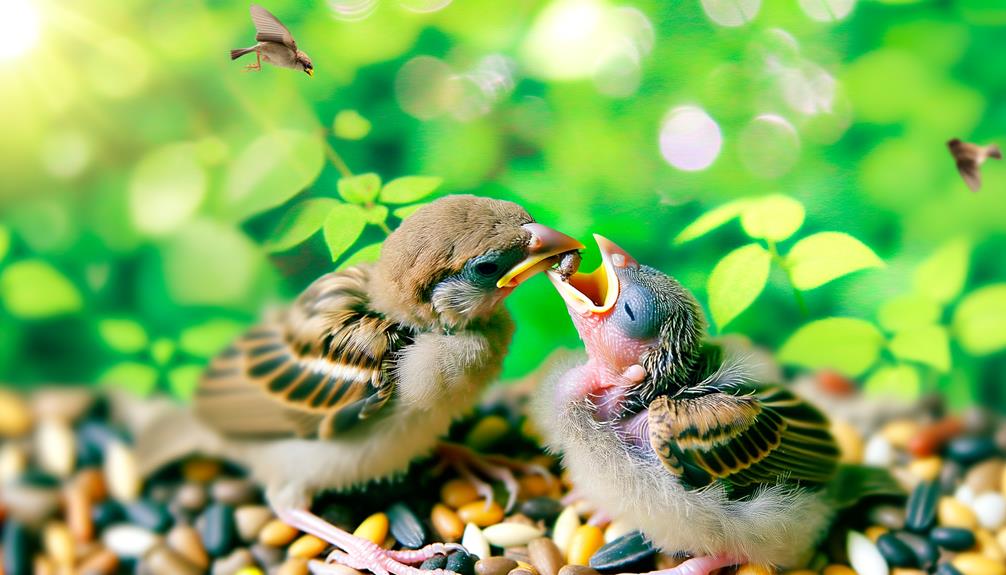
To ensure optimal growth and development, baby sparrows need a diet rich in proteins, fats, and essential nutrients specific to their species. You'll need to focus on providing high-protein sources, such as insects like mealworms or caterpillars, which are critical for muscle and feather development.
Additionally, guarantee their diet includes sufficient fats, which are essential for energy storage and metabolic functions.
In their natural habitat, sparrow parents deliver a variety of insects and seeds to their young, guaranteeing a balanced intake of necessary minerals and vitamins. Mimicking this diet as closely as possible in captivity is crucial.
Offering finely crushed eggshells can provide calcium, supporting bone growth. Remember, their nutritional needs are species-specific, so always prioritize authenticity and quality.
Risks of Feeding Bread
When you feed baby sparrows bread, you're not providing them with the essential nutrients they need for proper growth. Bread lacks the necessary proteins, fats, and vitamins, leading to potential malnutrition.
Additionally, it can cause digestive issues and impact their overall health, making them more susceptible to disease.
Nutritional Value Deficiency
Feeding baby sparrows bread deprives them of essential nutrients like proteins, fats, and vitamins, leading to developmental issues and compromised immune systems. Bread lacks the amino acids necessary for muscle development and repair, which are essential for fledglings.
Additionally, it doesn't provide the fats needed for energy reserves and proper cell function. Vitamins like A, D, and E, which are crucial for growth, feather development, and immune response, are also missing. Observations indicate that sparrows fed primarily on bread exhibit slower growth rates and weaker bone structure.
Potential Health Issues
Baby sparrows consuming bread face significant health risks, including malnutrition, stunted growth, and weakened immune systems. Bread lacks essential nutrients like protein, calcium, and vitamins essential for their development.
Feeding them bread can cause crop impaction, where the ingested food forms a dense, indigestible mass, obstructing their digestive tract. You might notice symptoms such as lethargy, poor feather quality, and reduced survival rates. Additionally, bread's high carbohydrate content can lead to metabolic imbalances, increasing susceptibility to diseases.
As a caretaker, you should prioritize specialized diets rich in insects, seeds, and fruits to guarantee proper growth and health. Your choices directly impact their well-being, so feeding baby sparrows appropriately is crucial for their survival and thriving.
Nutritional Needs of Baby Sparrows
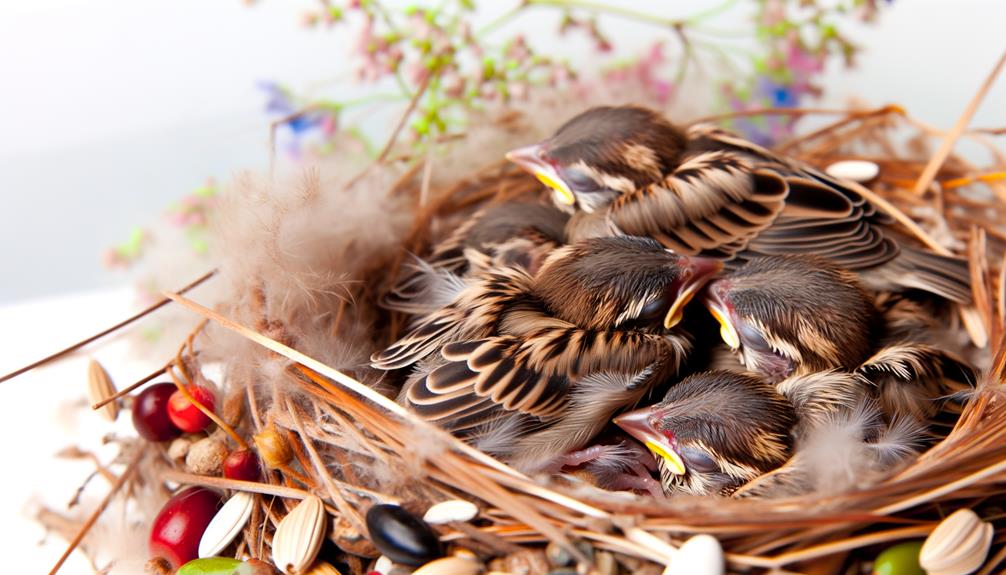
Understanding the nutritional needs of baby sparrows is essential for their growth and survival, necessitating a diet rich in proteins, fats, and essential vitamins. As a caregiver, you should focus on providing high-protein foods such as insects and small invertebrates, which are their primary natural diet. These proteins are pivotal for muscle development and overall health.
Additionally, fats are necessary for energy, helping the fledglings maintain their activity levels. Consider incorporating insect larvae, which are high in both protein and fat. Vitamins, particularly Vitamin D, calcium, and phosphorus, are critical for bone development.
Offering a balanced diet that mimics their natural food sources ensures baby sparrows develop strong, healthy, and ready for the challenges of their environment.
Common Misconceptions
You might think bread is a suitable food for baby sparrows, but it's a common misconception.
Bread lacks the essential nutrients, like proteins and fats, vital for their growth and development.
Instead, a diet rich in insects and seeds better supports the metabolic needs of Passer domesticus fledglings.
Bread Nutritional Value
Many people mistakenly believe that bread provides adequate nutrition for baby sparrows, but it lacks essential proteins and fats necessary for their development.
Bread primarily consists of carbohydrates, which offer minimal nutritional value for Passer domesticus (house sparrows).
Observations show that while adult sparrows might peck at bread, relying on it for fledgling nutrition can lead to malnourishment and developmental issues.
Baby sparrows require a balanced diet rich in proteins, fats, and micronutrients to support their rapid growth and feather formation.
Carbohydrates alone can't fulfill these dietary requirements.
When you're dedicated to aiding the survival of these delicate birds, understanding the inadequacy of bread's nutritional profile is pivotal.
Prioritize their well-being by recognizing and addressing their specific nutritional needs.
Appropriate Sparrow Diet
While bread is inadequate for baby sparrows, other common misconceptions about their diet can also lead to nutritional deficiencies and health problems. Many believe seeds alone suffice, but baby sparrows require high-protein foods like insects to thrive. At this developmental stage, their rapid growth necessitates nutrients found only in a varied diet.
Feeding them solely seeds or grains can result in poor feather development and weakened immune systems. You should incorporate mealworms, crickets, and appropriately sized insect larvae to mimic their natural feeding patterns. Additionally, avoid offering milk or sugary foods, as these can cause digestive issues.
Properly balancing their diet ensures you're fostering strong, healthy sparrows ready for eventual independence.
Safe Feeding Practices

Ensuring safe feeding practices for baby sparrows involves selecting appropriately sized seeds that are free from harmful additives and contaminants. You must closely observe the seed composition, ensuring it matches the nutritional needs of Passer domesticus. Contaminated seeds can lead to malnutrition or toxicity, impacting their fragile development.
Consider the following precautions when feeding baby sparrows:
- Avoid seeds treated with pesticides, as they can be lethal.
- Select seeds low in fat to prevent digestive issues.
- Ensure seeds are small enough to prevent choking hazards.
- Check for mold on seeds, as it can cause respiratory infections.
- Store seeds in a dry, cool place to maintain freshness.
Your meticulous care can greatly enhance the survival and health of these delicate creatures.
Healthy Food Options
To further support the nutritional needs of baby sparrows, incorporate a variety of healthy food options such as finely chopped fruits, soft insects, and specially formulated bird pellets. These options provide essential vitamins, minerals, and proteins essential for their growth and development.
Finely chop fruits like apples and pears to guarantee easy consumption. Soft insects such as mealworms and small crickets offer high protein content, crucial for muscle development. Specialized bird pellets, designed for young avians, supply balanced nutrients tailored to their species-specific requirements.
Signs of Malnutrition
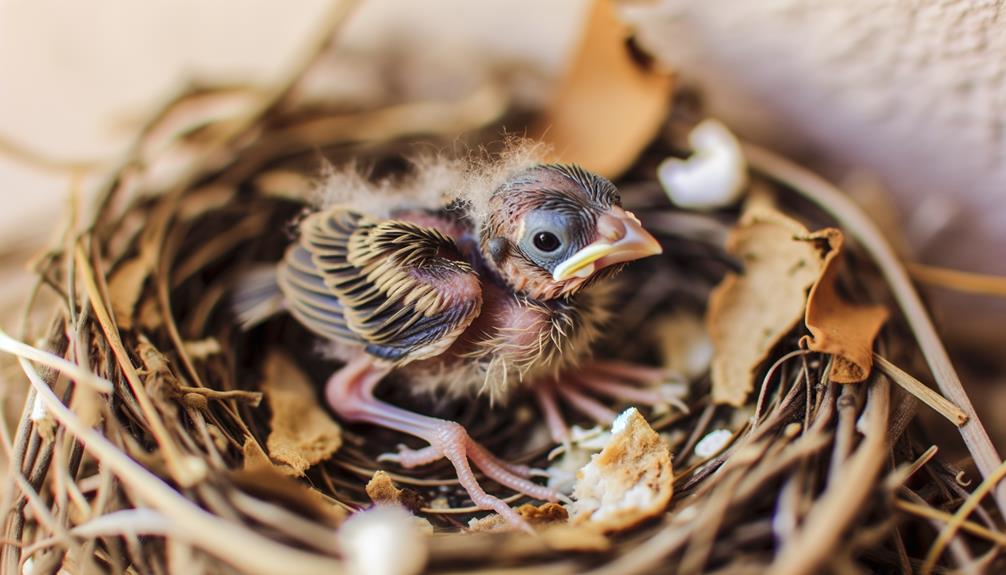
You'll notice signs of malnutrition in baby sparrows through poor feather development, where feathers appear sparse and brittle.
Weight loss indicators include a prominent keel bone and an overall frail appearance.
Lethargy and weakness present as reduced activity levels and difficulty perching or flying.
Poor Feather Development
Poor feather development in baby sparrows, often characterized by irregular growth patterns and brittle texture, is a clear sign of malnutrition. You'll notice that the feathers mightn't grow uniformly, appearing sparse or uneven.
Additionally, the feathers may lack the natural sheen and flexibility seen in healthy birds. This condition results from deficiencies in essential nutrients, particularly proteins and vitamins.
To evoke emotion and emphasize the seriousness, consider these heart-wrenching signs:
- Sparse feather coverage
- Frayed or broken feathers
- Lack of feather color vibrancy
- Delayed molting process
- Visible skin patches
Weight Loss Indicators
In baby sparrows, weight loss can be a critical indicator of malnutrition, often evidenced by a noticeable reduction in overall body mass and a pronounced keel bone. You'll observe that the pectoral muscles shrink, and the bird's chest appears concave.
Healthy sparrows have a rounded, full breast, while malnourished ones display a sharp, protruding keel bone. Monitoring their weight regularly is crucial; use a precise scale to track changes. Additionally, compare the sparrow's current weight to standard age-specific growth charts.
Rapid or continuous weight loss should prompt immediate dietary adjustments. Ensure they receive a balanced mix of seeds, insects, and supplements to promote peak health. Always consult avian experts if malnutrition signs persist.
Lethargy and Weakness
Lethargy and weakness in baby sparrows can be early signs of malnutrition, often characterized by a lack of energy, reduced activity levels, and difficulty maintaining normal posture. When you observe these signs, it's critical to act quickly to prevent further health deterioration.
Malnourished sparrows may show:
- Drooping wings that indicate muscular weakness.
- Fluffed-up feathers as they try to conserve heat.
- Infrequent chirping, a stark contrast to their usual vocal activity.
- Labored breathing, suggesting compromised respiratory functions.
- Prolonged periods of inactivity, even during daylight hours.
Addressing these symptoms involves providing a balanced diet rich in necessary nutrients. Avoid feeding them bread, as it lacks essential proteins, vitamins, and minerals.
Your attentive care can make a significant difference in their recovery.
Impact on Growth
Feeding baby sparrows bread can greatly hinder their growth due to its lack of essential nutrients and proteins necessary for development. When you provide bread, you're offering a food source that's deficient in amino acids, vitamins, and minerals crucial for a sparrow's growth stages. This deficiency can lead to malnourishment and impaired physical and cognitive development.
| Bread Component | Sparrow Nutritional Need |
|---|---|
| Carbohydrates | Proteins & Amino Acids |
| Low Fiber | Vitamins (A, D, E, K) |
| High Salt | Calcium & Phosphorus |
| Additives | Omega-3 & Omega-6 Fats |
Recognizing these nutritional gaps, you comprehend that depending on bread compromises the fledgling's overall health, making it less likely to thrive and reach maturity. Make sure their diet is balanced to promote robust growth.
Preparing Homemade Bird Food
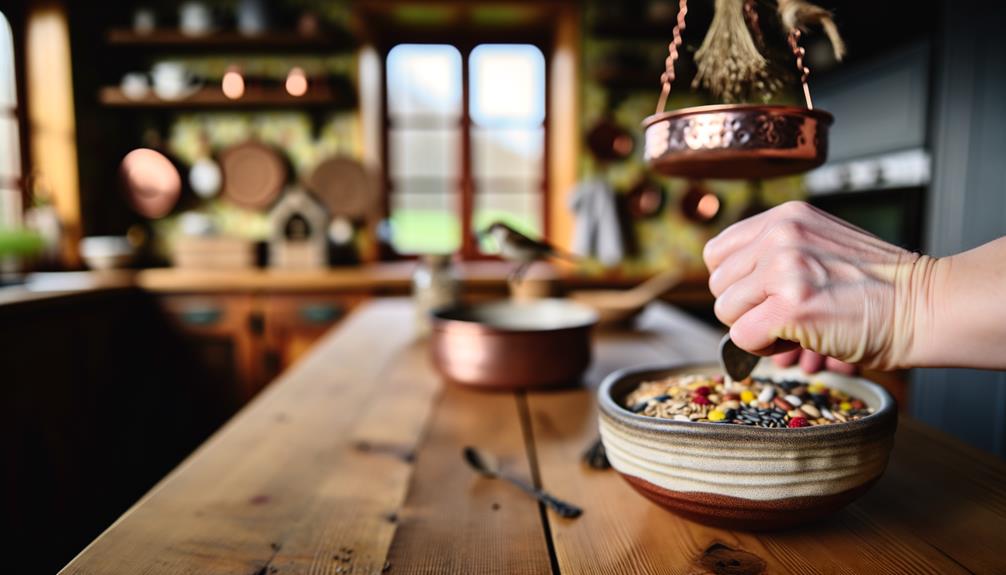
Creating homemade bird food guarantees that baby sparrows receive a nutritionally balanced diet tailored to their specific developmental needs. To foster the best possible growth, focus on creating a mixture rich in proteins, fats, and essential vitamins. Make sure the ingredients mimic what baby sparrows would naturally consume in the wild.
- Boiled egg yolk: High in essential proteins and fats.
- Insect larvae: Packed with proteins essential for growth.
- Finely chopped greens: Provide necessary vitamins and minerals.
- Ground whole grains: Supplies energy and fiber.
- Calcium supplements: Strengthens bones and beak development.
Recommended Commercial Feeds
Selecting the fitting commercial feed for baby sparrows guarantees they receive a balanced diet that supports their rapid growth and development. Opt for feeds specifically formulated for passerines, as these contain the necessary nutrients such as proteins, fats, vitamins, and minerals. Brands like Kaytee and ZuPreem offer high-quality options.
Check that the feed has a finely milled texture, making it easier for sparrow chicks to ingest. Avoid generic birdseed mixes, as they lack the essential components required for the delicate physiology of baby sparrows. You should also examine the ingredient list for harmful additives or excessive fillers.
Consistently provide fresh feed and clean water to prevent contamination and promote peak health. This meticulous care fosters their robust development.
Emergency Feeding Tips
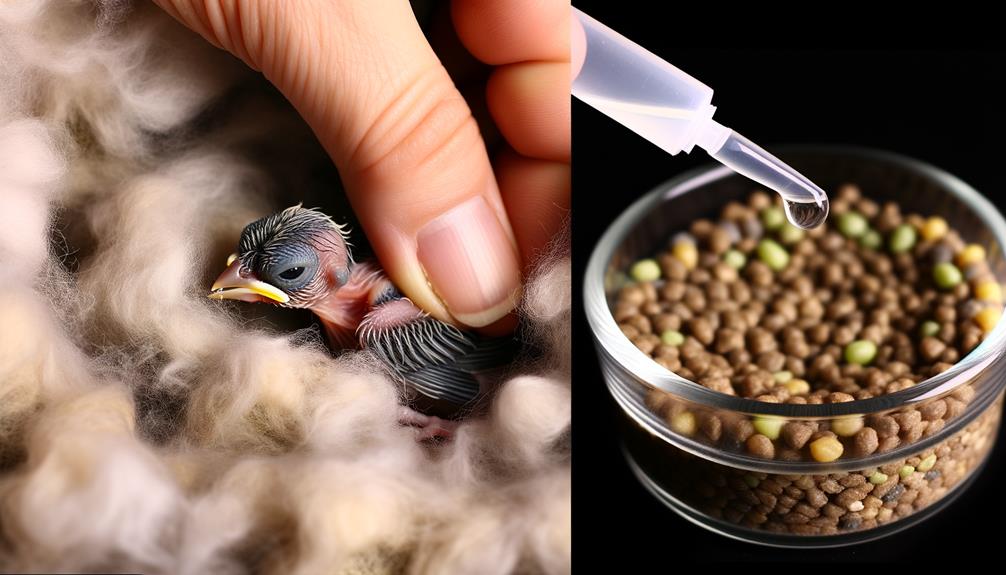
In emergency situations, how can you make certain baby sparrows receive the critical nutrients they need when commercial feeds are unavailable? You'll need to act swiftly and use readily available foods that mimic their natural diet. Here are some quick, nutrient-rich options:
- Boiled eggs: Mash them finely to provide essential proteins and fats.
- Moistened dog or cat kibble: Soak in water until soft, offering a balanced nutrient profile.
- Mealworms or small insects: High in protein, ideal for growth.
- Unsweetened applesauce: Provides hydration and natural sugars.
- Finely chopped greens: Such as spinach, for essential vitamins.
Always make certain food is soft and easy to swallow. By following these tips, you'll support their survival during critical early stages.
Long-term Care Strategies
To guarantee the long-term health and development of baby sparrows, you must consistently provide a balanced diet that mirrors their natural nutritional intake. Baby sparrows thrive on a diet rich in protein and essential nutrients. You should feed them a mix of insects, seeds, and fruit to mimic their wild diet.
| Food Type | Nutritional Benefit |
|---|---|
| Insects | High protein |
| Seeds | Essential fats |
| Fruit | Vitamins and minerals |
Maintaining a clean environment is vital. Regularly sanitize feeding tools and habitat to prevent disease. Monitor their growth and adjust their diet and care as needed to ensure peak health. By following these guidelines, you'll support their progression into strong, healthy adult sparrows.
Conclusion
Essentially, feeding baby sparrows bread is akin to offering them empty calories; it can't meet their nutritional needs.
Prioritize their health by sticking to scientifically-backed feeding practices. Remember, their little bodies crave proteins and essential nutrients, not just filler.
If uncertain, opt for recommended commercial feeds or homemade options tailored to their species. By doing so, you're not just feeding them—you're nurturing their growth and ensuring their survival.
Isn't that what they truly deserve?

